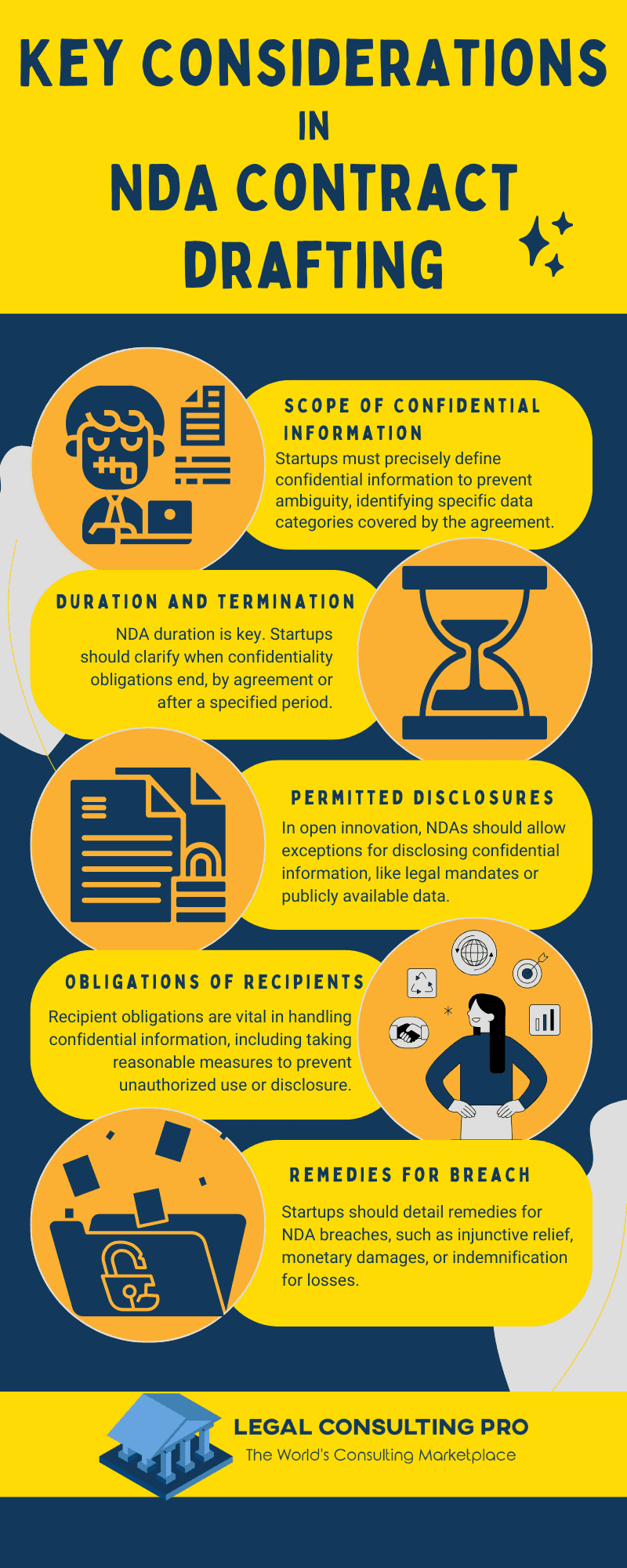In the fast-paced world of startups, where ideas are currency and collaboration is key, protecting intellectual property (IP) while fostering innovation is a delicate balance. This delicate dance is made even more complex in the age of open innovation, where sharing and collaboration are encouraged for growth and success. Non-disclosure agreements (NDAs) play a pivotal role in safeguarding sensitive information amidst this dynamic landscape. In this article, we’ll delve into the nuances of contract drafting NDAs for startups, emphasizing the importance of contract drafting and contract management in ensuring legal protection and fostering innovation.
Understanding the Essence of NDAs
At its core, a Non-Disclosure Agreement (NDA) represents a foundational legal instrument designed to safeguard sensitive information shared between parties engaged in a business relationship. For startups, whose success often hinges on their ability to innovate and protect their intellectual property, NDAs are indispensable tools. These agreements serve as robust shields, safeguarding proprietary knowledge such as trade secrets, strategic blueprints, and product developments from unauthorized disclosure or misuse. This protection becomes especially critical when startups are engaging with a variety of stakeholders, including potential investors, strategic partners, or external contractors.
In the fast-paced and interconnected world of startups, collaboration and innovation are paramount. This ethos has given rise to the concept of open innovation, which emphasizes the exchange of ideas and resources across organizational boundaries to drive collective progress. However, this collaborative paradigm presents a unique challenge for startups: how to strike a delicate balance between the imperative to protect confidential information and the desire to foster open collaboration.
On one hand, startups must zealously guard their intellectual property to maintain their competitive edge and secure future opportunities. On the other hand, they cannot afford to operate in isolation, as partnerships, alliances, and knowledge-sharing are often essential for growth and success. In this context, NDAs become indispensable tools for startups, serving as the legal framework through which they can engage in collaborative ventures while mitigating the risks associated with sharing sensitive information.
Startups face a myriad of scenarios where NDA contract drafting is crucial for protecting their interests:
- Engaging with Investors: When pitching their business ideas to potential investors, startups must divulge sensitive information about their technology, market strategies, and financial projections. NDA contract drafting provide startups with the assurance that their proprietary information will not be exploited by investors or disclosed to competitors.
- Forging Strategic Partnerships: Collaborating with other companies, whether for joint ventures, licensing agreements, or research partnerships, often involves sharing confidential information. NDA contract drafting establishes clear boundaries and expectations regarding the use and protection of shared information, laying the groundwork for fruitful collaboration.
- Contracting with Service Providers: Startups frequently rely on external contractors or service providers for various functions, from product development to marketing. NDA contract drafting ensures that these third parties uphold strict confidentiality standards, safeguarding the startup’s trade secrets and proprietary data.
- Recruiting Talent: As startups grow, they recruit talent from diverse backgrounds to drive innovation and expansion. NDAs play a critical role in ensuring that employees and contractors respect the confidentiality of sensitive information they encounter during their tenure with the company.
In the context of open innovation, NDAs take on added significance as startups navigate the tension between secrecy and collaboration. While startups must remain vigilant in protecting their intellectual property, they cannot afford to isolate themselves from the broader ecosystem of innovation. Instead, they must adopt a strategic approach to NDAs that enables them to share knowledge selectively while safeguarding their most valuable assets.
Effective NDA contract drafting in the age of open innovation requires startups to:
- Tailor Agreements to Specific Contexts: NDA contract drafting should be customized to address the unique needs and risks of each business relationship. Startups must carefully delineate the scope of confidential information, define permissible uses, and specify exceptions to confidentiality obligations.
- Promote Transparency and Trust: Open communication and transparency are essential for building trust between parties. Startups should clearly articulate their expectations regarding confidentiality and engage in open dialogue with partners to foster mutual understanding and alignment.
- Embrace Collaborative Tools and Platforms: Leveraging technology can streamline the NDA process and facilitate secure collaboration. Startups can use digital platforms for contract drafting, signing, and managing NDAs, enhancing efficiency and reducing administrative burdens.
- Stay Vigilant and Adaptive: The landscape of open innovation is constantly evolving, and startups must remain vigilant to emerging threats and opportunities. Regularly reviewing and updating NDAs ensures that they remain relevant and effective in mitigating new risks.
By embracing the principles of open innovation while leveraging the protective framework of NDA contract drafting, startups can navigate the complex terrain of collaboration and confidentiality with confidence. These agreements serve not only as legal safeguards but also as enablers of innovation, providing startups with the assurance they need to forge ahead on their journey of growth and success.
Key Considerations in NDA Contract Drafting
- Scope of Confidential Information: Startups must clearly define what constitutes confidential information to avoid ambiguity. This includes identifying specific categories of data or information that will be considered confidential under the agreement.
- Duration and Termination: Determining the duration of confidentiality obligations is crucial. Startups should specify the terms of the NDA contract drafting and conditions under which confidentiality obligations cease, such as upon mutual agreement or expiration of a certain period.
- Permitted Disclosures: In the spirit of open innovation, NDAs should outline exceptions where disclosure of confidential information is permitted. Common exceptions include disclosures required by law, disclosures to authorized personnel, or information already in the public domain.
- Obligations of Recipients: Clarity regarding the recipient’s obligations concerning the handling and protection of confidential information is essential. This includes implementing reasonable measures to prevent unauthorized disclosure or use of the information.
- Remedies for Breach: Startups should include provisions outlining remedies in the event of a breach of the NDA, such as injunctive relief, monetary damages, or indemnification for losses incurred due to the breach.
- Jurisdiction and Governing Law: Determining the jurisdiction and governing law of the NDA is crucial for resolving disputes. Startups should consider factors such as the location of parties and the enforceability of the agreement in relevant jurisdictions.

Contract Drafting and Contract Management Best Practices
Effective contract drafting and contract management are essential for startups to maximize the benefits of NDAs while minimizing legal risks. Here are some best practices to consider:
- Tailored Agreements: Avoid using generic NDA templates and instead draft agreements tailored to the specific needs and circumstances of the startup. Consider seeking legal advice to ensure comprehensive coverage and compliance with applicable laws.
- Clear Communication: Communicate the importance of confidentiality to all parties involved and ensure mutual understanding of the NDA terms. Clear communication can help prevent misunderstandings and disputes down the line.
- Contract Management: Implement robust contract management systems to track and manage NDAs effectively. This includes maintaining records of signed agreements, tracking expiration dates, and monitoring compliance with confidentiality obligations.
- Regular Review and Updates: NDA contract management and drafting should be periodically reviewed and updated to reflect changes in business practices, regulatory requirements, or organizational structures. Regular review ensures that NDAs remain relevant and effective over time.
- Employee Training: Provide training to employees on the importance of confidentiality and their obligations under NDAs. Educating personnel on best practices for handling sensitive information can help mitigate risks of inadvertent disclosures.
- Enforcement Strategies: Develop strategies for enforcing NDA contract management and drafting, including monitoring for potential breaches and taking prompt action to address any violations. Swift and decisive enforcement sends a clear message about the seriousness of confidentiality obligations.
Conclusion
In the age of open innovation, startups must navigate the complexities of protecting confidential information while embracing collaboration and growth. Contract drafting and contract managing NDAs effectively is paramount to achieving this delicate balance. By carefully considering key provisions and implementing best practices in contract drafting and contract management, startups can safeguard their intellectual property, foster innovation, and build successful partnerships in today’s competitive landscape.
Similar blogs:
Data Privacy Minefield: Navigating GDPR and CCPA Compliance in International Contract Drafting







































